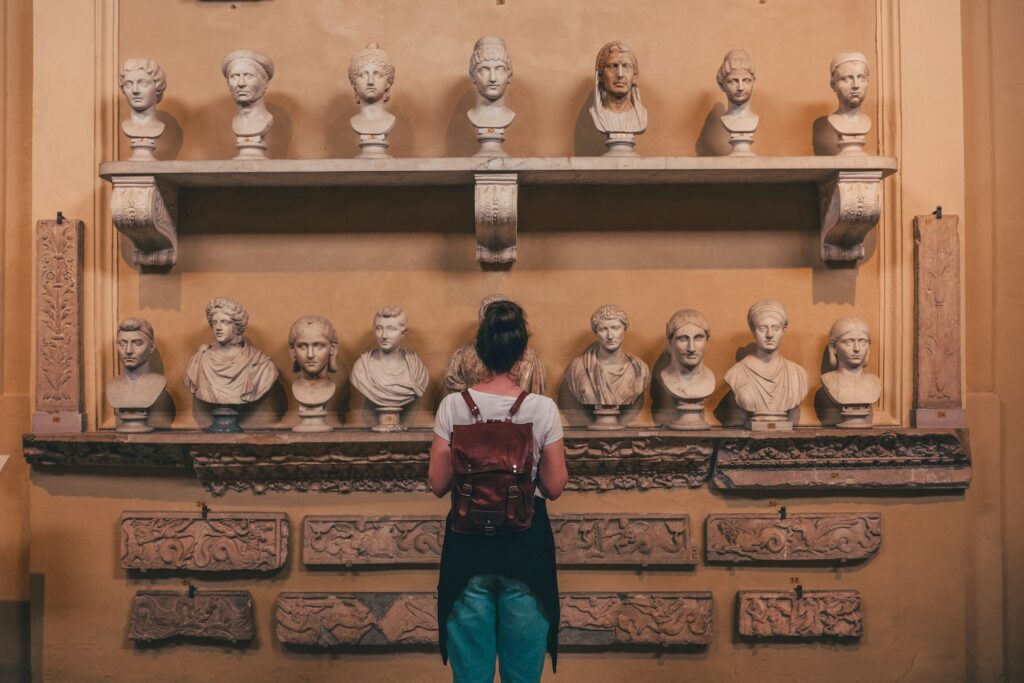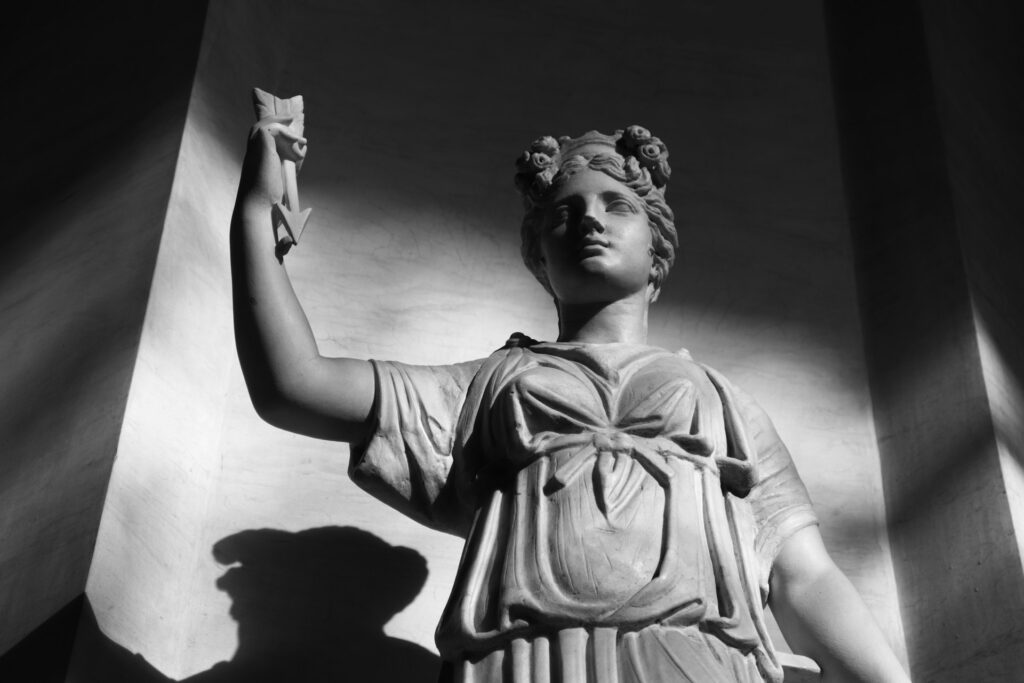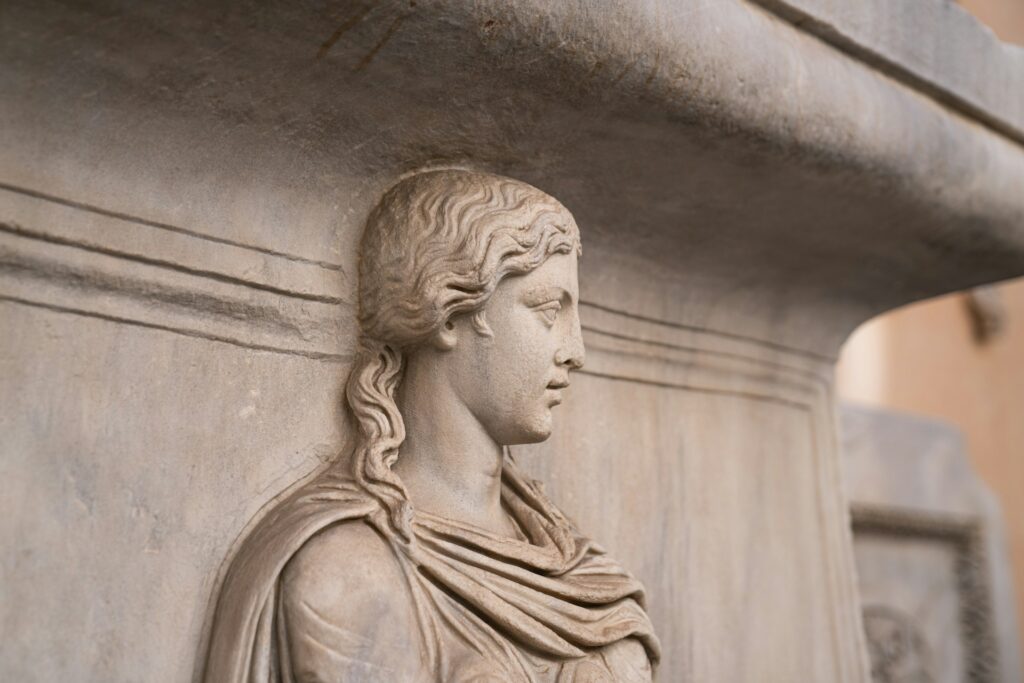Ancient Rome is known for the remarkable rights it bestowed upon its citizens – but those rights rarely extended to women.
The legal status of women in ancient Rome was defined as ‘patria potestas’ – literally, the ‘power of the father’. Women were controlled by the men in their lives, could not vote or own property, and were often used as pawns in political marriages. The feminine ideal was the Roman ‘matron’: a beautiful woman that produced lots of children, managed the household and its finances, and limited her hobbies to weaving and chatting.
However, some Roman women subverted these prescribed roles to become some of the most powerful women in history. Want to learn more about some amazing women who operated in this man’s world? Read on…
Before you dive in – a reminder that we recently launched our new Women-Only Tours. Created for women, by women, you’ll not only meet incredible and inspiring female local guides and experts on each of 11 global itineraries, but you’ll be traveling with other likeminded women.
Livia Drusilla

Drusilla’s image graces Roman statues in museums from St. Petersburg to Spain, her delicate features a picture of Roman womanhood. Her beauty caught the eye of Rome’s first Emperor, Augustus, who arranged for her to be divorced from her first husband and to marry him instead.
But Livia proved to be more than just a pretty face, ensuring her son Tiberius was made Augustus’ successor. After Augustus died, he had a cult dedicated to him – which Livia played a major role in perpetuating. This position gave her real political power and status, including a seat among the revered Vestal Virgin priestesses whenever she attended the theater. It made her one of the most powerful women in history.
Livia’s son Tiberius found her influence so troubling he refused to execute her will, but her grandson Claudius deified her when he took power. A statue of Livia was allegedly even carried to public games by elephants.
Read next: Everything You Need to Know About Our New Women-Only Tours
Agrippina the Elder

Born on a remote island in the Tyrrhenian Sea in 14 BCE, Agrippina the Elder was the granddaughter of Augustus and one of the most powerful women in history. The ambitious Agrippina was married to Germanicus, a military general whose campaigns in modern-day Germany had won him huge popularity – but also the envy of the Emperor Tiberius.
Instead of staying at home, Agrippina chose to join her husband in the military camps. Besides being a morale boost to the troops, she was also shrewd: in 15 CE, as an enemy tribe approached, she prevented the destruction of a temporary bridge over the Rhine, because she wanted to ensure no Roman was left behind.
Germanicus died in 19 CE and Agrippina suspected Tiberius of his poisoning. Agrippina brought Germanicus’ ashes home to Rome, a powerful gesture which rallied ordinary people to her side; Tiberius, however, was afraid of her growing influence and had Agrippina and her children exiled to the island of her birth. Her stoic image lives on in a plethora of ancient statues, Reinassance paintings, and even Roman cameos.
We think you’ll like: Everything You Can Learn About How Rome Was Built, in a Day
Agrippina the Younger

Agrippina the Elder had six children, one of whom took her name. Born in 15 AD in Germany, Agrippina the Younger was like her mother: fiercely independent and highly ambitious. However, she quickly recognised that her power could only be wielded in a male body.
After having her first husband poisoned, she married her uncle, Emperor Claudius, in 49 CE. Claudius was so enamored with his new wife that he gave her the title of ‘Augusta’, the highest female position in the land, and named the German place of her birth ‘Colonia Agrippina’ – this would later evolve into ‘Cologne’.
Agrippina the Younger also managed to convince Claudius to adopt her son from her first marriage, Nero, and make him heir over Claudius’ own son. Claudius then died in suspicious circumstances in 54 CE – Agrippina’s involvement in his death was no secret. Agrippina found herself in a position of ultimate power: her husband was dead, and her son was too young to rule, so she took up the position of regent. Sculptures show Agrippina crowning Nero: it’s perfectly clear where power really lay. Initially, Nero relied upon her council, but as he grew older he began to resent her power over him.
Nero attempted to have his mother killed, but a woman like Agrippina couldn’t be silenced so easily. Sources tell us that Nero put his mother on a boat designed to sink, but she swam ashore. So, he sent three knife-wielding assassins: but Agrippina had the last laugh, as she asked the assassins to stab her in the womb, as it had produced such a monstrous son. She wasn’t just one of the most powerful women in history, but one of the most cunning, too.
Save for later: These history experiences will enrich your knowledge of the ancient world
Helena

This humble Greek woman from the 3rd century ended up becoming one of Christianity’s founding mothers. Although she was of low birth, she married the future Roman Emperor Constantius I Chlorus and bore him a son, Constantine, in 270 CE. Constantius later divorced Helena, but after Constantine became Emperor in 306 CE, he made sure his beloved mother was given her rightful privilege.
As a Christian and the Dowager Empress, Helena went on pilgrimages to the Holy Land, where she ordered churches to be built in the key sites of Bethlehem and Jerusalem. She was also given access to the Imperial Treasury in order to fund her expeditions to discover the relics of Christ, including the True Cross. It’s even said that Helena was responsible for Constantine’s conversion to Christianity – putting a once-persecuted faith at the centre of the Roman world.]
Bookmark this one: Meet Asta Kristrún Ragnarsdottir: an inspiration to all Icelandic women
Fulvia

At first glance, Fulvia was the epitome of Roman womanhood: devoted to her husband, the politician Clodius, providing him with two children and supporting his career. When he was murdered, she mourned, yet wielded significant influence over Clodius’ allies.
Fulvia – a wealthy and powerful widow – would later marry the general Mark Antony. She supported his ambitions, devised policies that won Antony the adoration of the people, and used her political connections to make Antony unstoppable.
After Antony had Cicero (a vocal opponent) murdered, it’s said Fulvia gleefully stabbed his tongue with her hairpin, as punishment for slandering the couple. At the height of her power, she was one of the strongest women in history – the philosopher Plutarch claimed she wanted to “rule a ruler and command a commander”.
When Antony abandoned Fulvia for Cleopatra and Egypt, Fulvia entreatied Antony’s allies to start a war in his name, which would force Antony back to Italy. The rebellion failed, and Fulvia fled to Greece, where she died in obscurity. However, her gruesome revenge on Cicero has lived on in numerous works of art – Fulvia is a character hard to forget.
We think you’ll also like: Connecting with the women who MAKE TRAVEL MATTER®
Discover the might of ancient Rome on Best of Italy




